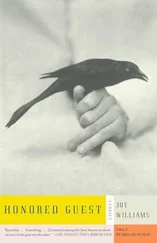AN ANNAL OF CRIME, the girl begins. The woods are hushed, waiting for the night. Light comes late here and leaves early. From where she and Grady are sitting, only a scrap of sky can be seen, a tear in the crown of the trees. A buzzard circles high in the tear as though it were his inescapable arena. Of course he owns the sky but to the boy and girl, he seems pinned to this small pocket.
“The tidy housewife,” Grady says, “mopping up the world.”
The girl lies back and studies the bird gratefully. Interruptions shape our hours. How else can our time here be measured? “It is a very peculiar thing about buzzards,” she says. “People do not care for them. No one tells their children charming stories about the Little Vulture that Could. No pretty myths have sprung up around them. And yet they are just as good as a unicorn.”
He laughs. “Better than a unicorn any day.” He loves her, he loves her. Where is the danger?
“Despite their great size,” she says, “they never kill and will not touch food that shows any sign of life. That was one of the most pleasant attributes of the unicorn.”
“The buzzard is more wonderful also because he exists.”
“That is always true,” the girl agrees. “The unicorn was so gentle he would not even step on live grass for fear of injuring it.”
“That is not even a consideration of the buzzard, he is so pure.” He kisses the girl softly. The bird floats out of view. There seems a small black dot where he had been.
“Would you like a little something to drink?” the girl asks miserably. She goes into the trailer. The boy ambles down to the dock. There’s a logjam of branches and leaves a little offshore. Tiny fish sprinkle off it like stars at his approach and drop off into deep water. In the trailer the girl fills two glasses with ice from the cooler and spills in a little gin. She fills another glass with raw gin and drinks it. She washes out the glass and goes down to the boy.
“You didn’t care for that truck full of mirrors, did you?” he says.
“It made me dizzy. I was afraid we’d get confused and run off the road.”
“No way,” he says in the light lilt of the country.
“They seemed to be mocking us,” the girl says haltingly. Her throat pulses, hoarse with the gin. “The way they were arranged. That closed tepee. It seemed they had taken us out of the world. There was just ourselves riding. Anywhere you looked, that was all that was left.”
“There’s a carnival in Torrent’s Landing, that’s probably where it was going.”
“On to the fun house,” she says unhappily.
They sit on the dock. A turtle climbs up on the logjam.
The gin is so cold and clear. The girl hangs suspended in it.
“I’m sorry we didn’t get to the beach today,” he says. “We’ll go tomorrow if you’d like.”
“Yes, another time.”
He holds her face between his hands. “What is it, blueness? Too much alcohol in the blood surrogate?”
She shakes off their joke from the brave new world. “You never ask me any questions,” she says stubbornly. She knows how stupid this sounds. His body so close to her is unnerving. She rises without moving as though for love. Her throat is a glacier, melting.
“Ah, blueness,” he says wearily. He rubs his chin. The sound is staggering. It seems to resound inside her head. Like axles grinding.
“I want to tell you a little story. It’s just a little story I read.” She sips her drink. “It would seem to have a bearing on our situation.”
“Our situation is fine,” he says.
She tosses her head. “This is how I would like to begin,” she says. “With this little story.” He sighs. She hears it like a sound that hasn’t happened yet, like the first cry her baby will make. “An annal of crime,” she announces. “In the French countryside in 15 say 14, an eleven-year-old girl was married to a boy her own age. The wedding was not consummated for several years, but soon they were old enough to live together in a portion of the fine house that would be theirs upon the death of the boy’s father. The father was a cruel man. Once, he had struck his only son with such force that he broke the boy’s jaw and knocked out four of his rear teeth. No one felt the old man’s passing to be an unfortunate event. The young couple moved into the house they were heir to and began their instruction in the management of the rich estate. The girl was taught her uxorial duties. They were soon parents of a baby boy although they were hardly more than children themselves. The girl was faithful and mild and obedient. She grew to love her husband although he offered her little reason to. The child had become a handsome but harsh and passionless man, besides being a casual father, quick to anger and slow to please. Yet they had another child, the seasons changed, the harvest came and went and so on.”
“A regular saga,” Grady says politely and without interest.
“It was not that they did not get along. The girl had many fine memories of their life together. She couldn’t imagine being happier or anything being other than it was. Then one spring morning, he came to her and told her that it was necessary for him to go to another town. A three days’ ride away. He was going there to buy the land that was adjacent to their own. The owner lived there and it was necessary that he meet with him. He said he would be gone a week. She kissed him dutifully and saw him off. Of course he was not gone for a week. Years went by. It seemed that he had vanished forever.”
“The scoundrel!” Grady interjects. “Of course we must remember he had been married since he was twelve.”
“She never lost hope that he would return. She raised her children and tried to keep their father living in their minds. She kept the farm flourishing and themselves rich. And of course she was true. Everyone was in 15 say 28.”
The girl finishes her drink. A dragonfly is on the rim of her glass. He stays on it as she raises it to her lips. He remains while she puts it down again.
“Then he came back. Lean from the wars for that was where he had gone. The same fellow certainly. All the old servants rejoiced, all the old friends. The children were delighted and the young wife found life worth living once more. She also found her prayers for his return had been answered double strength for he was a much more loving and kind man than he had ever been before. He was tender, honorable and exemplary to an extreme. She had never felt such pleasure; she had never known such joy. Then she began to worry. She bore another son and her worries increased. A terrible doubt had taken hold of her. She did not think that this man was, her love, her true husband. He certainly looked like him. He was even missing the four teeth that her husband had lost as a boy. He seemed to recall and even extrapolate on all the incidents of their life together before his long absence. Neither his children nor his servants nor his own sister and mother who still lived on the farm had ever entertained such a bizarre notion that he was anyone other than who he appeared to be. Nevertheless, the young wife’s suspicion became her belief, strong as her awareness of the strong love she felt for the man. She confided in her husband’s sister. The sister was understandably dismayed. She felt that the girl was losing her mind. Quickly, the household became aware of the astonishing nature of her thoughts. She would have nothing more to do with her husband, refusing to share his bed, refusing to even discuss the matter with him. He tried to be understanding although, daily, his wife became more hysterical and committed to the notion that he was an impostor. Eventually, despite the opposition and incredulity of everyone, she managed to bring him to court. There was no witness against him but herself, holding her nursing baby in her arms. The charges were dismissed as preposterous, yet how could this reassure her? Shortly after this, several shabby fellows from the battlefield, on hearing of the strange case, came to her and claimed that they had actual knowledge that indeed this man was a fraud, that her true husband had sold the facts of life together to this lookalike for a considerable amount of money and was still living, a professional adventurer. The wife, relieved but heart-broken, went to court again. This time the man she had so steadfastly accused, the father of her youngest child, was led before the judge in chains. She wept to see him so, for, as I’ve mentioned, before her doubts, she had never known such happiness or love. It still seemed, however, that the charges would be dismissed once again and forever for the court was losing its patience and there was no additional proof other than the statements of these very unsavory and unpleasant soldiers. But …”
Читать дальше












